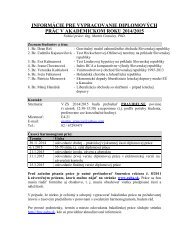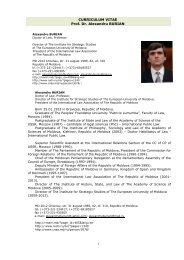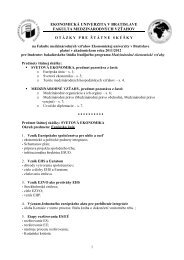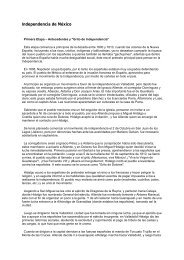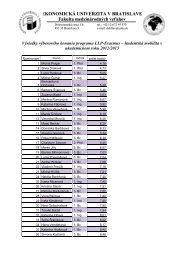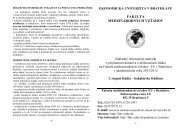rozvojová pomoc a spolupráca - Fakulta medzinárodných vzťahov
rozvojová pomoc a spolupráca - Fakulta medzinárodných vzťahov
rozvojová pomoc a spolupráca - Fakulta medzinárodných vzťahov
- No tags were found...
You also want an ePaper? Increase the reach of your titles
YUMPU automatically turns print PDFs into web optimized ePapers that Google loves.
traditional neoclassical assumptions of free market. On the contrary, an activeapproach of states and external support through e.g. foreign direct investmentsor development assistance is necessary to fulfil the aim. Moreover, besideseconomic barriers, social and cultural barriers must be broken to trigger growthand development. Thus, growth theories accentuate modernization in economic(industrialization, technology, transition from subsistence agriculture to cashcropping),political, social and cultural (education, family) sense as an importantassumption to development, with the vital role of state. In this regard, features ofgrowth theory correspond with ideas of Keynesian theoretical stream 29 . Theconception of development as a modernization process with the characteristicshas survived the last 40 years of debates and empirical analysis, particularlyoutside the research community. 30In practice, import substitution industrialization became the most oftenrecommended strategy for developing world, based on growth theory. Theessence of the strategy lies in the protection of domestic industrial branches inthe initial stage of their development through tariffs, quotas, incentives and othertools, simultaneously leading to the reduction of imports of newly, homeproduced,goods. In an ideal case, domestic production should proceed in thedirection from consumer to capital-intensive products. However, the lastassumption is difficult to fulfil. On the contrary, since the initial stage more andmore capital-intensive products are imported from developed countries,negatively influencing trade balance of developing countries. Developmentceased, especially in the case of countries with insufficiently large markets.Import substitution industrialization was, with limited successes, implementedin some countries of Latin America. 31In 1960s a new paradigm of development studies, as a reaction to thedisillusion from the achievements of import substitution industrialization andmodernization strategies, emerged, dependency theory. Compared to thegrowth theory, dependency theory does not understand national states as singleunits in the world. On the contrary, developing countries are a part of thecomplex economic world system and just this fact is the main reason29 JOHNSTON, R. J. et al.: The dictionary of human geography. 4 th edition. Malden:Blackwell, 2000, 958 pp.30 MARTINUSSEN, J.: Society, State and Market. A guide to competing theories ofdevelopment. Halifax: Fernwood Publishing, 2003, pp 38 - 39.31 DICKEN, P.: Global shift. Reshaping the global economic map in the 21.st century. NewYork: Guilford Press, 2003, 632 pp.27



